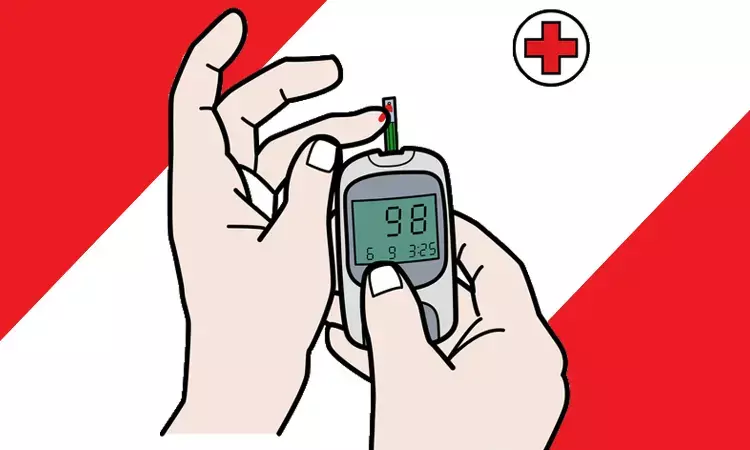- Home
- Medical news & Guidelines
- Anesthesiology
- Cardiology and CTVS
- Critical Care
- Dentistry
- Dermatology
- Diabetes and Endocrinology
- ENT
- Gastroenterology
- Medicine
- Nephrology
- Neurology
- Obstretics-Gynaecology
- Oncology
- Ophthalmology
- Orthopaedics
- Pediatrics-Neonatology
- Psychiatry
- Pulmonology
- Radiology
- Surgery
- Urology
- Laboratory Medicine
- Diet
- Nursing
- Paramedical
- Physiotherapy
- Health news
- Fact Check
- Bone Health Fact Check
- Brain Health Fact Check
- Cancer Related Fact Check
- Child Care Fact Check
- Dental and oral health fact check
- Diabetes and metabolic health fact check
- Diet and Nutrition Fact Check
- Eye and ENT Care Fact Check
- Fitness fact check
- Gut health fact check
- Heart health fact check
- Kidney health fact check
- Medical education fact check
- Men's health fact check
- Respiratory fact check
- Skin and hair care fact check
- Vaccine and Immunization fact check
- Women's health fact check
- AYUSH
- State News
- Andaman and Nicobar Islands
- Andhra Pradesh
- Arunachal Pradesh
- Assam
- Bihar
- Chandigarh
- Chattisgarh
- Dadra and Nagar Haveli
- Daman and Diu
- Delhi
- Goa
- Gujarat
- Haryana
- Himachal Pradesh
- Jammu & Kashmir
- Jharkhand
- Karnataka
- Kerala
- Ladakh
- Lakshadweep
- Madhya Pradesh
- Maharashtra
- Manipur
- Meghalaya
- Mizoram
- Nagaland
- Odisha
- Puducherry
- Punjab
- Rajasthan
- Sikkim
- Tamil Nadu
- Telangana
- Tripura
- Uttar Pradesh
- Uttrakhand
- West Bengal
- Medical Education
- Industry
Text messaging may Help teens control type 1 diabetes, finds study

Adolescence is a difficult period of development, made more complex for those with Type 1 diabetes mellitus (T1DM). The challenges of managing multiple doses of daily insulin administration, blood glucose monitoring, dietary and exercise requirements, can make self-care difficult and complicate outcomes. Adolescents with T1DM often have poorer diabetes outcomes than others, indicating that glucose control is difficult for them to maintain.
Data show that 88 percent of teens own a cell phone and more than 50 percent text with friends daily. Therefore, mobile technolgoies could be a key to helping adolescents more fully engage with their T1DM self-care.
In an article in the Journal of Diabetes Science and Technology, researchers outline their study combining text messaging with MyDiaText and financial incentives designed to help improve outcomes for adolescents with T1DM. The study results showed persistent engagement with and potential for increase in self-care using this intervention. MyDiaText was developed in 2012 by a collaboration with the School of Nursing, the School of Engineering and Applied Sciences and Children's Hospital of Philadelphia.
"We have demonstrated that text messaging is a promising method by which to engage adolescents with T1D who have suboptimal control, in their self-care and deserves further investigation. There remains a need to develop a digital health intervention that significantly impacts glycemic control in this population," writes Terri H. Lipman, PhD, CRNP, FAAN, the Miriam Stirl Endowed Term Professor of Nutrition, Professor of Nursing of Children and Assistant Dean for Community Engagement at the University of Pennsylvania School of Nursing (Penn Nursing). Lipman is the senior author of the article.
Hina Zahid Joined Medical Dialogue in 2017 with a passion to work as a Reporter. She coordinates with various national and international journals and association and covers all the stories related to Medical guidelines, Medical Journals, rare medical surgeries as well as all the updates in the medical field. Email: editorial@medicaldialogues.in. Contact no. 011-43720751
Dr Kamal Kant Kohli-MBBS, DTCD- a chest specialist with more than 30 years of practice and a flair for writing clinical articles, Dr Kamal Kant Kohli joined Medical Dialogues as a Chief Editor of Medical News. Besides writing articles, as an editor, he proofreads and verifies all the medical content published on Medical Dialogues including those coming from journals, studies,medical conferences,guidelines etc. Email: drkohli@medicaldialogues.in. Contact no. 011-43720751


